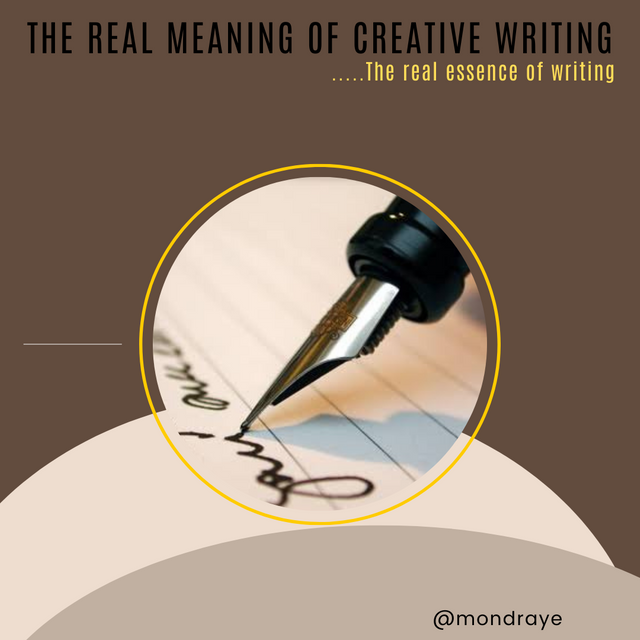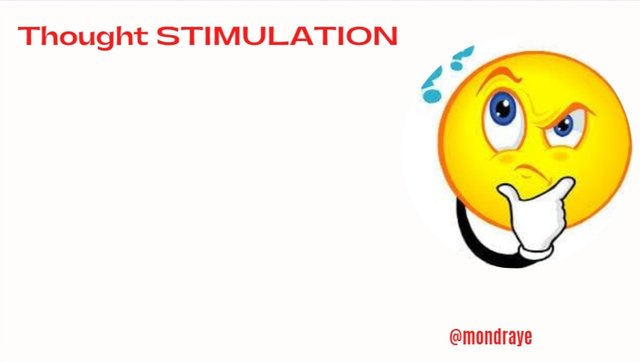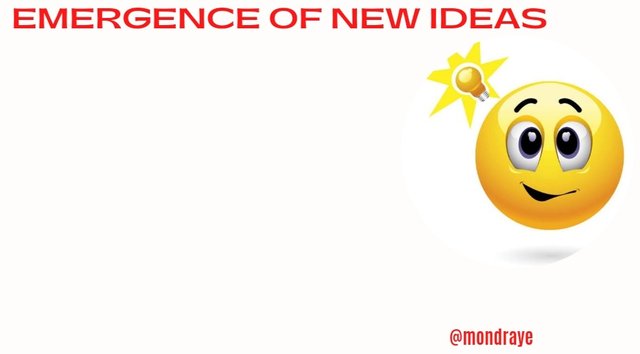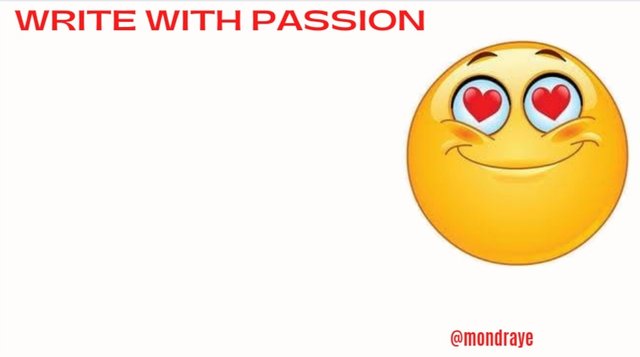Greetings,
It's your friend @mondraye and today I would be talking about creative writing.

We all here are writers with some writing for fun while others write for gains. It doesn't really matter what your aim of writing is for what matters is that we are all learning and our writings affects us in one way or the other.
It is impossible to separate writing from learning. As you develop your writing voice and identity, they go hand in hand. My self-improvement writing approach encourages a personal motivation to learn since I want to spread a good, uplifting message.
It's common for writers to describe the therapeutic benefits of writing. Their fabled "zen moment" comes while writing. When they are alone, either with a notebook and pen or while staring at an electronic screen, they are most creative. They may be authentic and let their actual selves shine when they write.
These are emotions that I also feel. The opportunity to grow and understand myself better as I write, though, are what I long for the most.
There is a reason why I write about improving oneself. Mostly because, although being confident that I'm an accomplished guy, I still see myself as a work in progress. I want to approach every day with the intention of bettering myself, mindful of how my actions affect others as well as how I am growing as a person. I make an effort to navigate life with awareness of my thoughts and the effects of my choices. In the grand scheme of things, I take a very strategic approach to both my work and the mark I want to leave on the world. However, I'm a complete nerd when it comes to researching the practical aspects of leading a moral life.

I adore the act of composing a blog post. I adore everything about it, including the initial concept, the ideas picked up along the route, and the use of the appropriate, powerful adjectives. I even love finishing the editing process, taking a break after some time to clear my head and then returning to the work to pay attention to the grammar and syntax.
The culmination of our thoughts and ideas, which our brains analyze and output through voice and writing, is a very special, individual experience. Every person possesses a brain that reads, synthesizes, and puts out knowledge that we can decide whether or not to share with those around us.
The best writers are those that challenge our thinking, arouse our emotions, edify us, and guide us into newer, more expansive conceptual horizons. I get goosebumps reading amazing writing. It brings to mind pictures of locations we have visited or have yet to see. The effects of outstanding writing on the mind include inspiration, imagination, and dynamic innovation.
Ideas for outstanding writing—even genius writing, I dare say—appear in our thoughts magically and seem to originate from nowhere. Certain concepts are divinely inspired. Some are the result of a day's or week's worth of encounters. other people from years past. Thoughts, thoughts, pictures, smells, and sounds leave imprints on our memories and subconscious minds that beg to be unveiled at a later time.

I believe great writing educates us more about who we are as people. A writer who is constantly seeking to improve her craft is one who writes science fiction or comic books.
The act of writing itself has the power to push a writer's creativity to new heights. She will diligently work on her verb tenses, vocabulary, and word choice there in order to write like Mark Twain. She will discover a great deal of history, character traits, or geography when researching a character, location, or plot theme.
Even if they are rare, flashes of genius can appear through our ideas, the people we surround ourselves with, and the whole focus on the things we love; the identification of our life's goals. This is largely influenced by love. Many writers' works are primarily motivated by love, usually for a significant other. Love shows itself through a passion for a certain goal and for success on a deep, personal level.
Love can be shown through a wish to improve our circumstances so that our loved ones might enjoy happier lives. Our purpose in life emerges when we fully devote ourselves to our interests, a destiny that God has indissolubly connected to our calling. We will develop our love for one another and for God here. That type of genius starts with simply an idea.
Because there is no compulsion to write for others when we write for ourselves, the writing process becomes less mysterious. Although I write each post with a specific audience in mind, I editorially approve in my head and when I proofread what I'd want to read just for myself. Before and after publishing, I read my posts again. In many ways, I write for you, the reader, but in other ways, my writing is also for the liberation of my soul—who I really am. I can assure you that at this point and probably forever, I am my own harshest critic.
I try to discover the essence of who I truly am via reflection and action. I investigate the things I want to know, what I want to discover, and the things I want to share—both with you and with myself. I sincerely hope my message resonates with you and that you recognize parts of me in your own life. The final product is what I'm aiming for, and I sincerely hope that it will be educational, enjoyable, and fulfilling for you. Consequently, I write for both my own benefit and that of others.

There's a reason why I and many others decide to write for general audiences. We want people to read what we've written. Just the facts. Otherwise, we would simply create language for ourselves. Some people write to gain attention, some to spread a message, and some to generate money. Regardless of where you are in your career or what your goal is, I hope that while you write, you are doing it with passion and purpose, on purpose, and with intention.
I advise anyone who wants to make a profession out of blogging to always write from the heart, whether you're writing a book, an essay for a prestigious magazine, or an article for business or academics. Without thinking about getting a nod, do it. Even though your effort will eventually be consumed by the public, hopefully in large quantities, you will be considerably happy with the final result. It's more sincere and true to write for yourself, in many respects. There is no facade since you have nothing to prove to anyone but yourself, who is the most essential person.
Thanks for reading..
Curated by @juzkid
SteemCor07 - Lifestyle Curation Team
Downvoting a post can decrease pending rewards and make it less visible. Common reasons:
Submit
Thanks for sharing this valuable tips with us here, truly we will be satisfied if we write from the heart. Continue to be active in our community we appreciate you!
Downvoting a post can decrease pending rewards and make it less visible. Common reasons:
Submit
Keep sharing friend
😀🎉🎉
Downvoting a post can decrease pending rewards and make it less visible. Common reasons:
Submit
Brillant idea!
Although, I am reading your post for the first time, I can hear your writer's voice.
Downvoting a post can decrease pending rewards and make it less visible. Common reasons:
Submit
Thank you for your opinion and for sharing your thoughts on writing with us. I agree with you that the most brilliant ideas come to us in ordinary life, and I will add that inspiration is very important for writing. This can be an event in life, a book read, a person, or someone's speech. For me, this example essay https://graduateway.com/brindis-speech/ was an inspiration where the author analyzes the different ways language can be used to manipulate and control people. The ideas of Dr. Jose Rizal are simple but very correct because we all need to understand that each of us is great, regardless of country or gender.
Downvoting a post can decrease pending rewards and make it less visible. Common reasons:
Submit